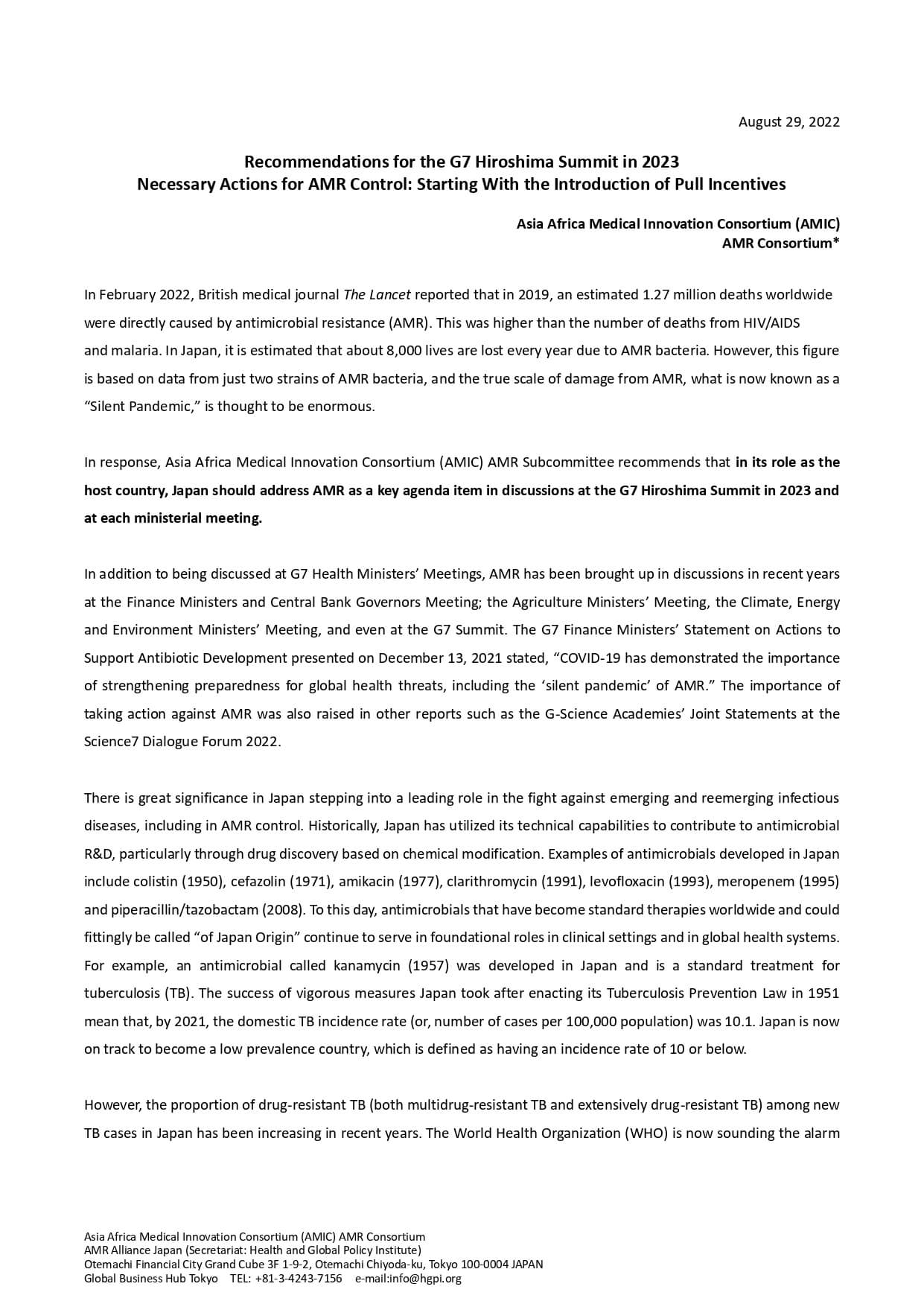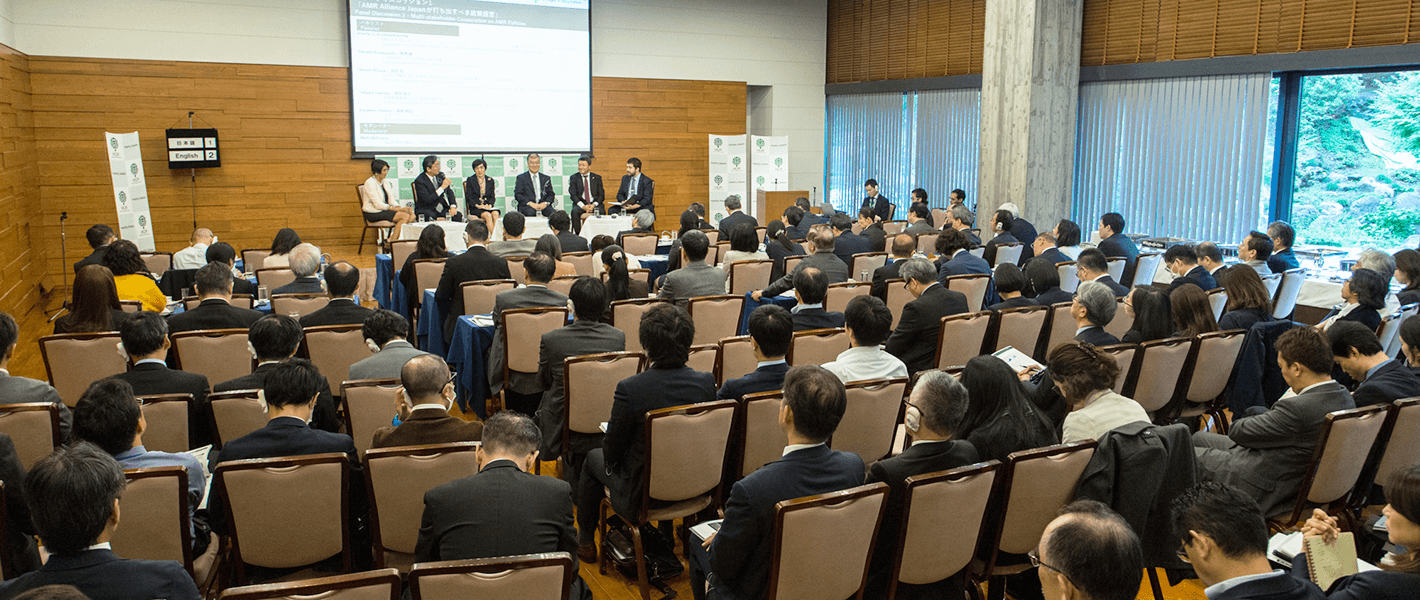[Recommendations] Recommendations for the G7 Hiroshima Summit in 2023 Necessary Actions for AMR Control, Starting with the Introduction of Pull Incentives (August 29, 2022)
- Home >
- Information >
- News >
- [Recommendations] Recommendations for the G7 Hiroshima Summit in 2023 Necessary Actions for AMR Control, Starting with the Introduction of Pull Incentives (August 29, 2022)
Asia Africa Medical Innovation Consortium (AMIC) AMR Consortium (Secretariat: AMR Alliance Japan) recommends that in its role as the host country, Japan should address AMR as a key agenda item in discussions at the G7 Hiroshima Summit in 2023 and at each ministerial meeting.
In addition to being discussed at G7 Health Ministers’ Meetings, AMR has been brought up in discussions in recent years at the Finance Ministers and Central Bank Governors Meeting; the Agriculture Ministers’ Meeting, the Climate, Energy and Environment Ministers’ Meeting, and even at the G7 Summit.
As chair of the G7 Summit in 2023, as a key contributor to antimicrobial R&D, and as a leader in global efforts to combat emerging and reemerging infectious diseases, it is crucial for Japan to once again advocate for the importance of fighting the “Silent Pandemic” of AMR and for the country to fulfill its role in the international community based on the fact that no country acting alone can take complete measures for Prevention, Preparedness and Response (PPR) against infectious diseases.
“Recommendations for the G7 Hiroshima Summit in 2023: Necessary Actions for AMR Control, Starting with the Introduction of Pull Incentives” can be found below.
August 29, 2022
Recommendations for the G7 Hiroshima Summit in 2023
Necessary Actions for AMR Control: Starting With the Introduction of Pull IncentivesAsia Africa Medical Innovation Consortium (AMIC)
AMR ConsortiumIn February 2022, British medical journal The Lancet reported that in 2019, an estimated 1.27 million deaths worldwide were directly caused by antimicrobial resistance (AMR). This was higher than the number of deaths from HIV/AIDS and malaria. In Japan, it is estimated that about 8,000 lives are lost every year due to AMR bacteria. However, this figure is based on data from just two strains of AMR bacteria, and the true scale of damage from AMR, what is now known as a “Silent Pandemic,” is thought to be enormous.
In response, Asia Africa Medical Innovation Consortium (AMIC) AMR Subcommittee recommends that in its role as the host country, Japan should address AMR as a key agenda item in discussions at the G7 Hiroshima Summit in 2023 and at each ministerial meeting.
In addition to being discussed at G7 Health Ministers’ Meetings, AMR has been brought up in discussions in recent years at the Finance Ministers and Central Bank Governors Meeting; the Agriculture Ministers’ Meeting, the Climate, Energy and Environment Ministers’ Meeting, and even at the G7 Summit. The G7 Finance Ministers’ Statement on Actions to Support Antibiotic Development presented on December 13, 2021 stated, “COVID-19 has demonstrated the importance of strengthening preparedness for global health threats, including the ‘silent pandemic’ of AMR.” The importance of taking action against AMR was also raised in other reports such as the G-Science Academies’ Joint Statements at the Science7 Dialogue Forum 2022.
There is great significance in Japan stepping into a leading role in the fight against emerging and reemerging infectious diseases, including in AMR control. Historically, Japan has utilized its technical capabilities to contribute to antimicrobial R&D, particularly through drug discovery based on chemical modification. Examples of antimicrobials developed in Japan include colistin (1950), cefazolin (1971), amikacin (1977), clarithromycin (1991), levofloxacin (1993), meropenem (1995) and piperacillin/tazobactam (2008). To this day, antimicrobials that have become standard therapies worldwide and could fittingly be called “of Japan Origin” continue to serve in foundational roles in clinical settings and in global health systems. For example, an antimicrobial called kanamycin (1957) was developed in Japan and is a standard treatment for tuberculosis (TB). The success of vigorous measures Japan took after enacting its Tuberculosis Prevention Law in 1951 mean that, by 2021, the domestic TB incidence rate (or, number of cases per 100,000 population) was 10.1. Japan is now on track to become a low prevalence country, which is defined as having an incidence rate of 10 or below.
However, the proportion of drug-resistant TB (both multidrug-resistant TB and extensively drug-resistant TB) among new TB cases in Japan has been increasing in recent years. The World Health Organization (WHO) is now sounding the alarm regarding the oncoming health crises caused by emerging and reemerging infectious diseases, including drug-resistant TB and other diseases that cannot be treated with standard antimicrobial therapy.
The importance of measures to combat emerging and reemerging infectious diseases including AMR diseases has also been recognized by organizations other than health organizations like WHO. One prominent example is provided by the Sustainable Development Goals (SDGs), which were adopted in 2015 at the United Nations Sustainable Development Summit (UN Summit). Target 3.3 of the SDGs reads, “By 2030, end the epidemics of AIDS, tuberculosis, malaria and neglected tropical diseases and combat hepatitis, water-borne diseases and other communicable diseases.” Together, the international community is working to achieve these targets by 2030.
At the G7 Ise-Shima Summit in 2016, the previous time Japan served as host, each G7 member agreed that they would cooperate further to advance measures for AMR. Since then, Japan’s Basic Policy on Economic and Fiscal Management and Reform has included “strengthen efforts to promote AMR control and expanding systems for research, testing, and treatment” every year. In its most recent version, the Basic Policy on Economic and Fiscal Management and Reform 2022 placed strong emphasis on the importance of R&D and related measures as part of AMR countermeasures, saying, “We will draw conclusions based on a comprehensive study of specific methods to secure treatments for drug-resistant bacteria, such as market incentives, in the fight against drug resistance, and play a leading role in international discussions.”
Although AMR control has received continuous attention in Japan and overseas as a central topic in discussions on health crises, and domestic measures to combat AMR are progressing steadily, in the future, instead of merely examining these issues, we must reach conclusions and take concrete and effective actions. For example, Pharma Industry Vision 2021, which was presented in September 2021, stated, “We will consider introducing pull incentives and similar measures like those that other countries plan to implement.” In R&D, there have been new developments for institutional design. For example, the FY2022 MHLW science research program will begin accepting applications for “studies on institutional design that will contribute to antimicrobial development or contribute to regulating antimicrobial usage to combat AMR.” In addition, AMR was included on the tentative list of priority infectious diseases, and AMR countermeasures are now being considered by the Study Group on Securing Usable Medicines and Other Therapeutics for Infectious Diseases, which was established in 2022 to prepare for outbreaks of novel infectious diseases based on experiences with the COVID-19 pandemic. AMR is also being discussed as an independent topic in “Global Health Strategy – Steps for Meeting 2030 SDG Targets” from the Cabinet Secretariat Office of Healthcare Policy. It is necessary to work to ensure these policy statements and discussions lead to concrete measures, and take immediate action against the health threats posed by AMR.
As chair of the G7 Summit in 2023, as a key contributor to antimicrobial R&D, and as a leader in global efforts to combat emerging and reemerging infectious diseases, it is crucial for Japan to once again advocate for the importance of fighting the “Silent Pandemic” of AMR and for the country to fulfill its role in the international community based on the fact that no country acting alone can take complete measures for Prevention, Preparedness and Response (PPR) against infectious diseases.
About AMR Consortium
AMR Consortium was launched at the 6th Nikkei Asia Africa Conference on Communicable Diseases (now the Nikkei FT Communicable Diseases Conference) in 2019. It is the fifth subcommittee of the Asia Africa Medical Innovation Consortium (AMIC). Since its establishment, under the leadership of Co-Chair Shigeru Omi (Chairman, Japan Anti-Tuberculosis Association; Regional Director Emeritus, WHO Regional Office for the Western Pacific) and Co-Chair Kazuhiro Tateda (Professor, Department of Microbiology and Infectious Diseases, Faculty of Medicine, Toho University), this volunteer consortium comprising representatives from industry, Government, academia, and civil society has been holding repeated discussions on promoting AMR countermeasures with a particular focus on establishing a feasible system for pull incentives in Japan. AMR Alliance Japan has served as the secretariat of the AMR Consortium since its first meeting was held in January 2020. On March 24, 2021, “Recommendations to the Japanese Government on Establishing a Pull Incentive System for the Antimicrobial Market as a Response to the Health Crisis Caused by Infectious Diseases: Creating an Ecosystem for Sustainable Antimicrobial Development to Protect the Lives of the Public” was published.
About AMR Alliance Japan
AMR Alliance Japan was established in November 2018 as a multi-stakeholder, collaborative organization dedicated to the improvement of public health through the promotion of AMR countermeasures. As of August 2022, its members include MSD K.K., The Children and Healthcare Project, Shionogi & Co., Ltd., Sumitomo Pharma Co., Ltd., The Japanese Society of Antimicrobials for Animals, NISSUI Pharmaceutical Co., Ltd., Nippon Becton Dickinson Co., Ltd., The Japan Medical Association, The Japanese Society for Medical Mycology, The Japanese Society of Pharmaceutical Health Care and Sciences, The Japanese Society of Chemotherapy, The Japanese Society for Infection Prevention and Control, The Japanese Association for Infectious Diseases, The Japanese Society for Pediatric Infectious Diseases, The Japan Pharmaceutical Manufacturers Association, The Japanese Society of Therapeutic Drug Monitoring, The Japan Society of Hospital Pharmacists, The Pharmaceutical Society of Japan, The Japan Pharmaceutical Association, The Japanese Society for Clinical Microbiology, bioMérieux Japan Ltd., Himeji City, Pfizer Japan Inc., and Meiji Seika Pharma Co., Ltd. Health and Global Policy Institute (HGPI) serves as its secretariat.



